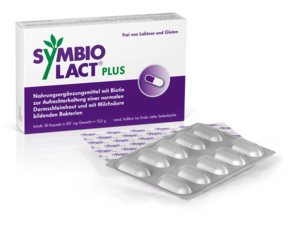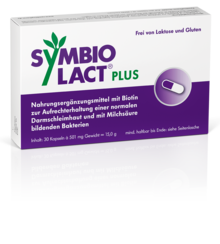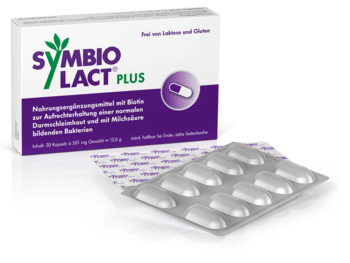PROVEN BACTERIAL STRAINS FOR EASY ORAL USE
SymbioLact® PLUS - Lactic acid bacteria capsules
In terms of its surface area, the gut is the largest interface in our body: Due to its numerous folds, the surface area of the gut is equivalent to that of two tennis courts. Nutritional components and fluids enter our body via the intestinal mucosa, and metabolic products leave our body through the same interface. A well-functioning intestinal mucosa is the prerequisite for a healthy metabolism. That is why it is important that the intestinal mucosa has an adequate supply of nutrients. The intestinal flora is central part of this.
Our intestinal flora is colonized by up to 10 billion bacteria, more than the entire number of cells in our body.
What does the intestinal flora do?
The intestinal flora consists of the total population of microorganisms colonizing our gut. These include various yeasts, fungi and predominantly bacteria. To date, researchers have recorded around 1,000 species of bacteria, but it is estimated that more than 40,000 species exist. Most bacterial species are not harmful to humans. They make their home in our gut, and some are even useful.
The composition of our intestinal flora is dependent on numerous factors and is different for every individual. External influences can have a positive or negative impact on the intestinal flora. A balanced, high-fibre diet ensures an adequate supply of nutrients to the intestinal bacteria. Likewise, an unbalanced, unvaried diet can result in changes to the bacterial composition. Medications, especially antibiotics, can also have a major impact on the intestinal flora.
Antibiotics are used to kill harmful bacteria. However, the substances contained in antibiotics not only kill harmful bacteria, they attack the entire intestinal flora. Because of this, antibiotic treatment can cause long-term damage and should be used with caution. A common side effect of antibiotic treatment is diarrhea, known as antibiotic-associated diarrhea.

Lactic acid bacteria – now in capsule form
SymbioLact® PLUS contains six different strains of natural intestinal bacteria from the upper and lower digestive tract. The bacteria are freeze-dried and protected in a vegetarian capsule coating. Each capsule contains at least 10 billion bacterial cultures, or 1x1010 colony-producing units (CFU) – more than most comparable products.
SymbioLact® PLUS contains the following bacterial strains:
Bifidobacterium bifidum, subsp. lactis
Lactobacillus acidophilus
Lactococcus lactis
Lactobacillus rhamnosus
Lactobacillus paracasei
Lactobacillus salivarius
As soon as the bacteria come into contact with fluid in the gut, they become active.
Biotin contributes to the maintenance of normal mucous membranes.
Biotin for a healthier intestinal mucosa
SymbioLact® PLUS contains the vitamin biotin. Biotin contributes to the maintenance of normal mucous membranes. The intestinal mucosa is the largest mucous membrane in the body and supplies the cells of the gut with nutrients. Moreover, biotin helps maintain normal skin and contributes to the normal functioning of energy metabolism and the nervous system.
SymbioLact® PLUS is available in any pharmacy!


